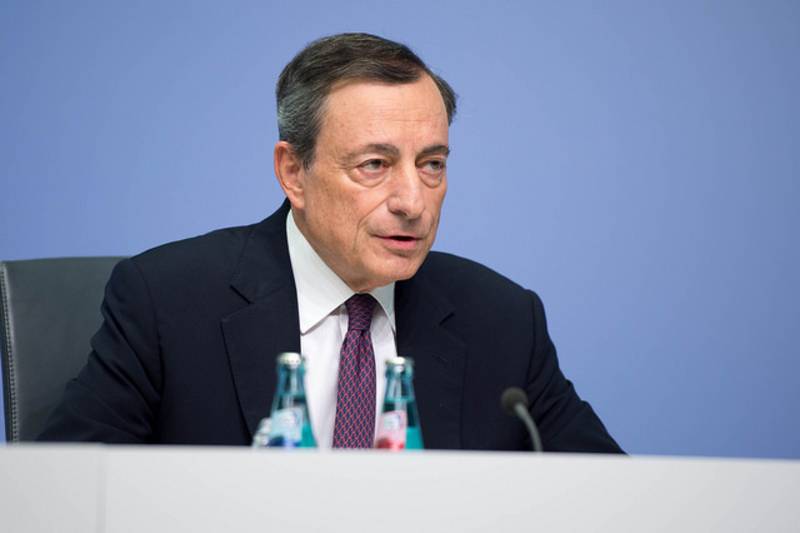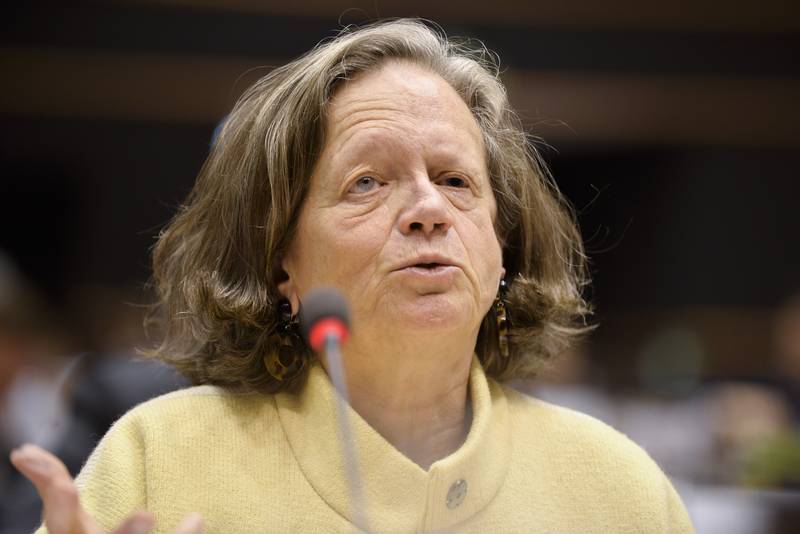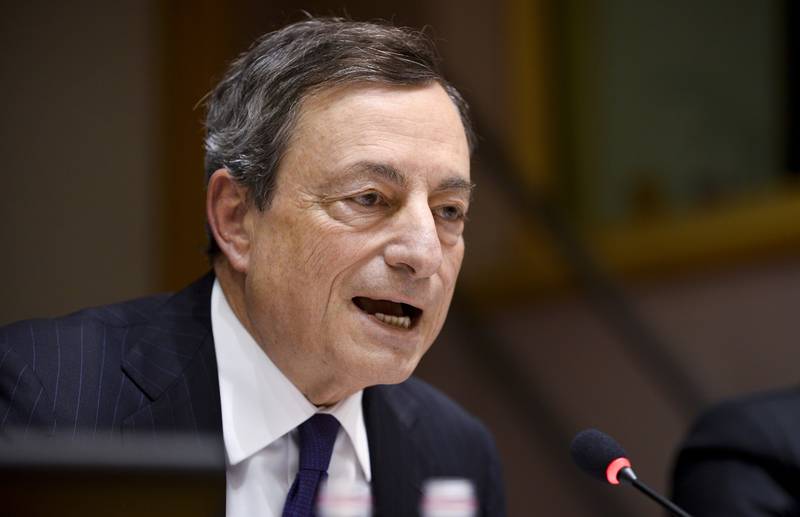Mario Draghi Plans and Labour Market Laughs
Adelina Marini, November 24, 2017
 The highest economic growth in a decade exceeding all expectations, as described by European Commission Vice President Valdis Dombrovskis (Latvia, EPP), responsible for the euro, during the presentation of the autumn package of the European Semester on 22 November. Unemployment has dropped down to almost pre-crisis levels and employment is breaking records. Investments are growing, public finances are improving, and therefore the markets expected the European Central Bank to start gradually changing its easy money policy.
The highest economic growth in a decade exceeding all expectations, as described by European Commission Vice President Valdis Dombrovskis (Latvia, EPP), responsible for the euro, during the presentation of the autumn package of the European Semester on 22 November. Unemployment has dropped down to almost pre-crisis levels and employment is breaking records. Investments are growing, public finances are improving, and therefore the markets expected the European Central Bank to start gradually changing its easy money policy.
The big news was expected in September but the Governing Council decided then that the most important decisions for a monetary policy change will be taken in October. However, on 26 October, the ECB decided to both maintain its policy and change it. There is no change in terms of interest rates. The bank has kept them saying they will remain at their current level - for the main refinancing operations 0.00%, on the marginal lending facility 0.25%, and the deposit facility -0.40%.
There is a change in the non-standard monetary measures, like the asset purchases programme (APP). It will continue with its current step of 60 billion euros monthly by the end of the year, and as of January it will be cut in half - down to 30 bn euros per month. The APP was launched on 22 January 2015 with an initial step of 80 billion euros per month. Its objective was to help significantly reduce yields on sovereign bonds by purchasing bonds on the secondary markets, and this, on its part, was supposed to overcome deflation. The programme is broadbased. It includes purchases of both private and public sector bonds.
In the spring, Mario Draghi announced the risk of deflation gone, but inflation remained too low to enable ECB to say it has fulfilled its mandate to ensure price stability, which is perceived met when inflation is close to but below 2%. It is the low level of inflation that is behind the Governing Council decisions in October. Among them is also the Eurosystem to reinvest the principal payments from maturing securities purchased under the APP. In addition, the main refinancing operations and the three-month longer-term refinancing operations will continue to be conducted as fixed rate tender procedures with full allotment for as long as necessary, and at least until the end of the last reserve maintenance period of 2019.
As Mario Draghi explained on 26 October, the monetary stimulus is still necessary to keep the favourable financing conditions which, for their part, are necessary for the sustainable return of inflation to its normal levels of close to but below 2%. ECB has name this change of its monetary policy a "recalibration". The Governing Council decisions were not adopted unanimously. The biggest differences were whether the programme should have a final date or should be left open-ended (it has a final date - September 2018). Mario Draghi described the discussion as one varying between consensus, broad consensus on some issues, and a huge majority on others.
Dude, where's my inflation?
 In September, the annual HICP inflation remained without change at 1.5%. Expectations are that it will drop a little by the end of the year because of the energy prices. The Bank forecasts that inflation will somewhat pick up in 2018. The reason for inflation lifelessness is labour markets. Participation is broadening in record scales. The number of unemployed in the euro area has dropped from 18.6 million in the second quarter of 2014 to 14.6 million in the last quarter of 2016. In 16 out of the 19 euro area countries positive employment growth has been registered. Moreover, employment has grown in around 60% of the sectors compared to 0 in mid-2014.
In September, the annual HICP inflation remained without change at 1.5%. Expectations are that it will drop a little by the end of the year because of the energy prices. The Bank forecasts that inflation will somewhat pick up in 2018. The reason for inflation lifelessness is labour markets. Participation is broadening in record scales. The number of unemployed in the euro area has dropped from 18.6 million in the second quarter of 2014 to 14.6 million in the last quarter of 2016. In 16 out of the 19 euro area countries positive employment growth has been registered. Moreover, employment has grown in around 60% of the sectors compared to 0 in mid-2014.
Not only elderly people and migrants joined the workforce but women participation is at its highest levels of all times. All this suggests that there will be increases of net wages. ECB has registered some movements but, generally, domestic pressure on costs has remained the same. During his regular hearing in the economic committee of the European Parliament on 20 November (his last for the year), Mario Draghi further developed his thesis that the lack of nominal growth of wages is the main reason for the weak inflation. Responding to a question by French MEP Pervenche Beres from the Socialists and Democrats group, Mr Draghi said all conditions are available for wage growth but this is still not happening.
He listed several potential reasons. It's possible that this is not due to the output gap of the euro area but the output gap of the rest of the world. However, there is no convincing evidence in support of this thesis, Draghi said, explaining that the output gap in the world is losing almost as much as in the euro area, which should evoke pressure. Another possible reason is that after a prolonged period of very low inflation, combined with risks of deflation, wage negotiations tend to look backward. At the moment, the main focus of wage negotiations is on jobs security rather than wage increases. A prolonged period of unemployment also makes conditions on labour markets very difficult.
There are other reasons, Mario Draghi deliberated aloud. He recalled that productivity is still low. As a matter of fact, the main recommendation in the European Commission's Annual Growth Survey for 2018 is precisely increasing productivity. Another explanation is current employment. Draghi is convinced that the situation with frozen wage growth is temporary and that if the accommodative monetary policy continues this will lead to wage growth, thence to inflation growth. He was firm in his belief that globalisation and digitalisation are not the main reasons for wage stagnation.
What if this is the new normal?
During his two-hour long hearing, only three questions were asked about the change of ECB's monetary policy. Anne Sander (EPP, France) asked what were the risks of the announced change and what impact will it have on EU's economy, especially bearing in mind that banks are the main source of funding for the economy. She also asked how did ECB plan to handle interest rates in an environment of ageing population. Mario Draghi explained that Governing Council decisions were adopted without any serious reactions by the markets, which is the best possible reaction. Later, responding to a question by another MEP, the ECB boss said this was due to the good communication policy which in itself has become an instrument of monetary policy.
The biggest risk Draghi sees at the moment is unwanted tightening of monetary policy caused by changing external conditions. They could be the geopolitical situation or policy changes by other major global players. He believes that the eurozone economy is big enough and domestic conditions are dominant so that such a risk can be cushioned. Jakob Von Weizsäcker (Germany, S&D) posed a big theoretical question about whether low interest rates were in fact the new normal and whether the ECB should reconsider the way it maintains financial stability. Mario Draghi was not much inclined to guess.
 Nevertheless, he said that if this were the new normal financial stability will turn into a dominant feature. In such a case, macro and micro prudential policies will have a leading role because the space for manoeuvre of macroeconomic policy is limited. He used the opportunity to again urge countries with very little fiscal space, as a result of the crisis, to take advantage of the good days to increase it. "Thats the best way to cope with this new normal or very low real rates", said the ECB boss.
Nevertheless, he said that if this were the new normal financial stability will turn into a dominant feature. In such a case, macro and micro prudential policies will have a leading role because the space for manoeuvre of macroeconomic policy is limited. He used the opportunity to again urge countries with very little fiscal space, as a result of the crisis, to take advantage of the good days to increase it. "Thats the best way to cope with this new normal or very low real rates", said the ECB boss.
In his statement in front of the members of the EP economic committee, Mario Draghi reiterated his call to complete the euro area. "The current economic outlook provides a unique opportunity to reduce the likelihood of severe shocks by strengthening the economic structures of member states, with policy actions both on the fiscal and structural side", he said and added that it is necessary to strengthen the architecture of the euro area so that it can withstand and manage shocks. Mario Draghi also said he welcomed the upcoming Euro Area summit on 15 December, at which leaders are expected to take important decisions to deepen the integration in the currency club. The success of this summit, however, is questioned by the political instability in Germany, caused by the failure of coalition talks there.
 Klaus Regling | © Council of the EU
Klaus Regling | © Council of the EU Mario Centeno | © Council of the EU
Mario Centeno | © Council of the EU Mario Centeno | © Council of the EU
Mario Centeno | © Council of the EU